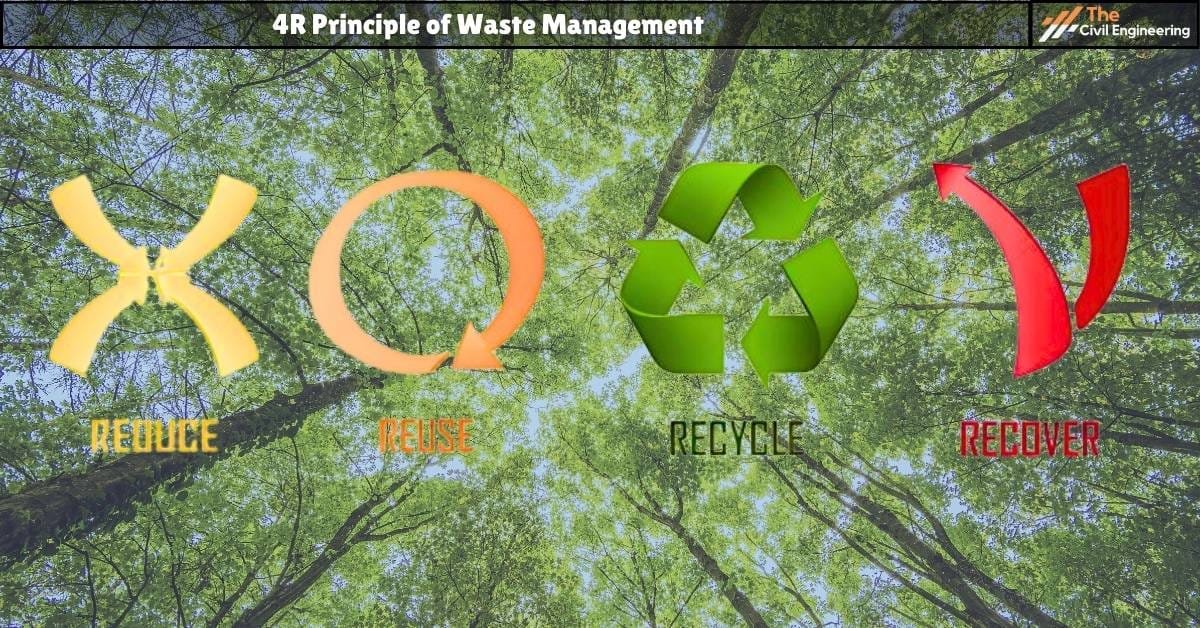Latest Update: (According to the newest Update in the 4R Principle, Refuse has been added to be 5R Principle.)
The useless materials that arise from various human activities (such as domestic trash, garbage, metal scrap, etc.) are solid waste materials. They directly affect the environment and cause land pollution as well as water pollution.
Due to the increase in industrialization and urbanization, many waste materials coming from it are being directly exposed to nature and are harming living plants and animals.
In the modern world, we depend much on ready-made and artificial products. There are many alternatives available for a single item. It has increased the production of soil waste along with the problems related to it. For managing such unwanted solid wastes, the 4R principle is introduced.
The 4R Principle is the widely used principle in solid waste management and depicts reduce, reuse, recycle & recover.

1. Importance of the 4R Principle
The importance of the 4R principle are:
a. To utilize the waste materials.
b. To maintain environmental health.
c. To minimize land and water pollution.
d. To reduce consumption of needless items.
e. To promote the use of degradable products.
f. To utilize products to their maximum life.
g. To refuse the unwanted use of items that reduce waste production.
2. 4R Principle – Types
4R represents Reduce, Reuse, Recycle & Recover. They are explained below:
a. Reduce:
Reduction includes all the activities that reduce solid waste generation in the environment.
We should always try to minimize the unnecessary use of artificial things or products in our daily lives.
We can reduce the solid waste in our community by considering the following points:
1. We should choose durable items while buying.
2. We should change our habit of using things, i.e., use washable clothes and napkins instead of one-time usable napkins and paper.
3. Use washable containers for lunches.
4. Use sacks instead of using non-reusable plastic bags.
5. We should buy recycled products.
6. It is better to use cotton bags for shopping.
7. Print on both sides of a paper to reduce waste production.
8. Warning signs should be printed on products showing the disposal method.
9. Buy in bulk to reduce individual packaging.
10. Choose products with minimal or no packaging.
11. Opt for digital documents instead of printed ones.
12. Compost kitchen waste to reduce landfill contributions.
b. Reuse:
The usage of any product itself without changing its form and composition is called Reuse.
It is the act of re-claiming the product by using it for different purposes.
Reuse increases the life of waste and reduces the production of waste so that it preserves the environment & its resources.
Reusing products not only contributes to the protection of nature but also saves us money.
The initial cost of reusable products is high but is highly beneficial from a long-term view.
We can reuse solid waste by considering the following points:
1. Use reusable plastic bags or cotton bags for shopping.
2. We should donate our old clothes & other items to charitable organizations.
3. Use plastic gallons to store water & oil.
4. Use old (second-hand) books, DVDs & CDs, etc.
5. Buy a rechargeable battery.
6. Reuse electronic devices after repairing.
7. Reuse glass jars for storage.
8. Repair and refurbish old furniture.
9. Refill soap dispensers instead of buying new ones.
c. Recycle:
Recycling means re-covering a previously used object and giving it a second life.
Recycling is the use of waste by processing & modifying it into another form.
It is done when it is not possible to reuse and reduce.
Paper & cardboard, glass, metal, debris from construction & demolition, etc. can be recycled and used again.
E.g.:
i. Paper is recycled into cardboard, toilet paper, tissue paper, etc.
ii. The newspaper is recycled into egg cartons, shoe boxes, etc.
iii. Metals and plastics can be recycled to form new products.
iv. Recycle aluminum and steel cans.
d. Recover:
Most of the materials thrown in the garbage can be used & processed in ways other than being destroyed. Such a process is recovering.
E.g.:
a. methane gas can be recovered from decomposing organic matter.
b. If plastic waste remains left over after being reduced, reused, and recycled. It can be used to make energy. It converts waste products into resources (such as fuel, heat, etc.) through biological means.
| Read Also: System of Sanitation, Conservancy System, Water Carriage System |
| Read Also: Earth Road, Types of Earth Road, Construction |


